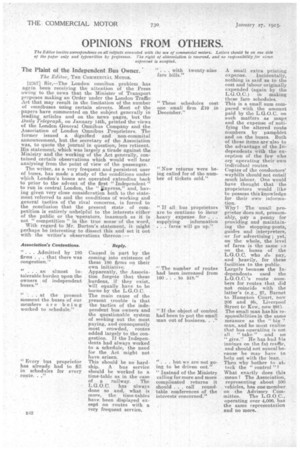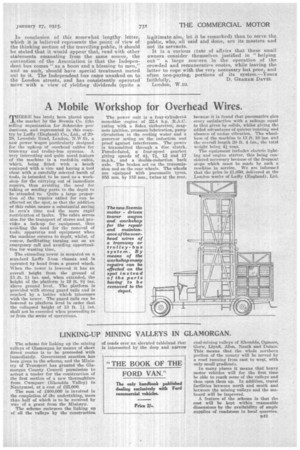OPINIONS FROM OTHERS.
Page 26

Page 27

If you've noticed an error in this article please click here to report it so we can fix it.
The Editor invites correspondence on all subjects connected with the use of commercial motors. Letters should be on one side of the paper only and typewritten by preference. The .right of abbreviation is reserved, and no responsibility for views
expressed is accepted, The Plaint ot the Independent Bus Owner.
The Editor, THE COMMERCIAL MOTOR.
12:167] Sir,—The London omnibus problem has again been receiving the attention of the Press owing to the news that the Minister of Transport proposes making an Order under the London Traffic Act that may result in the limitation of the number of omnibuses using certain streets.. Most of the papers have commented On the subject generally in leading articles and on the news pages, but the Daily l'eleYraph, on January 14th, printed the views of the London General Omnibus Company and the .Association of London Omnibus Proprietors. The former issued a dignified and non-commital announcement, but the secretary of the Association was, to quote the journal in question, less reticent. His statement, which was largely a tirade against the Ministry and the working of the Act generally, contamed certain observations which would well bear analysing from the point of view of the passenger.
The writer, as a very frequent and persistent user of buses, has made a study of the -conditions under which London's buses are operated extending back to prior to the advent of the first " Independent " to run in central London, the " gxpress," and, having given very close consideration both to the statement referred to and the conditions of working and general tactics of the rival concerns, is forced to the conclusion that the present state of corn-. petition is entirely unhelpful to the interests either of the public or the 'operators, inasmuch as it is not " competition " in the true sense of the word,
With regard to Mr. Burton's statement, it might perhaps be interesting to dissect this and set it out with the writer's observations thereon
Association's Contentions.
" . • . Admitted by 180 firms . . . that there was congestion."
. . . an almost in tolerable burden upon the owners of independent buses."
" . . at the present moment the buses of our members are being workedto schedule."
"Every bus proprietor has already had to fill in schedules for every route. . ."
Reply.
Caused in part by the coming into existence of these 180 firms on their own initiative.
Apparently, the Association forgets that these burdens, if they exist, *ill equally have to be borne by the L.G.O.C. The main cause of the present trouble is that the tactics of the independent bus owners and the questionable system of seeking out the most paying, and consequently most crowded, routes added largely to the congestion. If the Independents had always worked to a schedule, the need for the Act might not. have arisen.
This should be no hardship. A bus service should be worked to a time-table as in the case of a railway. The L.G.O.C. has always done so and, what is more, the time-tables have been displayed except on routes with a very frequent service. . . . with twenty-nine fare bills."
"These schedules cost one small firm 210 in December."
" Now returns were being called for of the number of tickets sold."
" If all bus proprietors are to continue to incur heavy expense for . . supplying information . . fares will go up."
"The number of routes had been increased from 160 . . to 518."
" If the object of control had been to put the small man out of business. . ."
. . but we are not going to be driven out."
"Instead of the Ministry calling for more and more complicated returns it should . . . call roundtable conferences of the interests concerned." A small extra printing expense. Incidentally, nothing is said as to the cost and labour originally expended (again by the L.G.O.C.) in making these fare schedules. This is a small sum compared with the amount paid by the L.G.O.C. on such matters as maps and the expense of notifying the altered route numbers by pamphlet and on the buses. Both of these items are also to the advantage of the Independents with the exception of the few who are operating their own individual routes.
Copies of the conductors' waybills should not entail much labour. One would have thought that the proprietors would like to possess this knowledge for their own information.
Why? The small proprietor does not, presumably, pay a penny for providing and maintaining the stopping-posts, guides and interpreters, or for advertising ; yet,. on the whole the level of fares is th:e same as on the buses of the L.G.O.C. who do pay, and heavily, for these facilities to the public. Largely because the Independents used the L.G.O.C.'s route numbers for routes that did not coincide with the latter's (e.g., 27, Barnet to Hampton Court, now 206 and 9b, Liverpool Street to Kew, now 291). The small man has his responsibilities in the same measure as the " big " man, and he must realize that bus operating is not all " take " and no " give." He has hail his innings on the fat traffic, and should not saueal because he may liavc to help out with the lean. Then why bother to attack the " control "2 What exactly does this mean? The Association, representing about 500 vehicles, has one member on the Advisory Com mittee. The L.G.O.C., operating over 4,000, has the same representation and no more. In conclusion of this somewhat lengthy letter, which it is believed represents the point of view of the thinking section of the travelling public, it should be stated that it would appear that, read with other statements emanating from the same source, the contention of the Association is that the Independent bus comes " as a boon and a blessing to men," and as such, should have special treatment meted out to it. The Independent bus came unasked on to the London streets, and has consistently operated more with a view of yielding dividends (quite a
legitimate aim, let it be remarked) than to serve the public, who, all said and done, are its masters and not its servants.
It is a curious ttate of affairs that these small owners consider themselves justified in " helping out" a large con-.::ern in the operation of the crowded and remunerative routes, while leaving the latter to cope with the very necessary but poor, and often non-paying, portions of its system.—Yours
• faithfully, D. GRAHAM DAVIS. London, W.10.






























